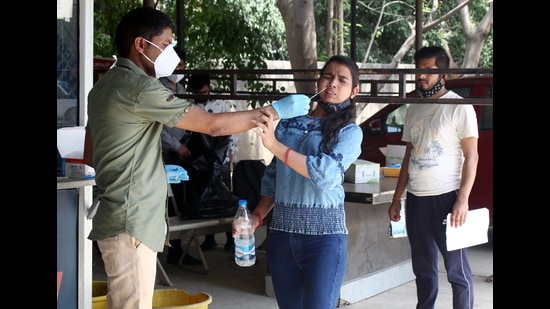India records over 2,000 Covid cases, but experts advise calm
There were also 214 new deaths recorded on Monday, but most of these were because the state of Kerala reconciled its records with unregistered past deaths
The number of new Covid-19 cases recorded nationwide rose above 2,000 for the first time since March 28, data released by the government showed on Monday, but experts cautioned against reading too much into the trend since hospitalisation and death rates have not risen in tandem.

There were also 214 new deaths recorded on Monday, but most of these were because the state of Kerala reconciled its records with unregistered past deaths.
“It’s an mRNA virus, so there will be mutations. What is important to note is hospitalizations, severity of symptoms, and death,” said Dr Sanjay Rai, professor, department of community medicine at New Delhi’s All India Institute of Medical Sciences. “During the Omicron wave also, we saw fewer hospitalisations. Therefore, high infection rate should not cause panic.”
The Union government stressed on the need for states to maintain “an effective watch and pre-emptive action to contain any imminent surge” in a letter to the state of Kerala, which, it said was not reporting state-level data regularly.
“It has been observed that Kerala has reported its state-level Covid-19 data after a gap of 5 days (since 13th April),” joint health secretary Lav Agarwal wrote in a letter to Rajan Khobragade, principal health secretary of Kerala. “This has impacted and skewed the status of India’s key monitoring indicators like cases, deaths, and positivity.”
“There is a need for continued intensive monitoring at state and district level to detect emerging challenges and undertake suitable steps for preparedness and management of Covid-19,” said Agarwal’s letter. “We need to continue maintaining an effective watch and take pre-emptive action to contain any imminent surge.”
Daily and diligent data reporting is critical for a meaningful understanding of the pandemic in the districts, state and national levels, according to the health ministry. “This is especially relevant as it is a highly infectious disease and also has an associated risk of emergence of new variants. Quick and continuous update of data will assist in India’s fight against the Covid-19 pandemic and will help not only in tracking and monitoring but will also help in defining the strategies and plans at the centre, state and district level,” the ministry said.
On data sharing, Dr Giridhara Babu, head of epidemiology at the Indian Institute of Public Health, said: “It is important to report deaths on a real-time basis to understand and respond to the changing dynamics of transmission. A death not accounted for or not reported discredits the very life of a human being. Delays and reconciliation of death data should be done as an exception, not as a rule”.






